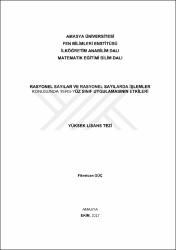| dc.description.abstract | Günümüzde gelinen noktada her disiplinin öğretimine yönelik birçok yöntem ve teknik mevcuttur. Teknoloji de bu yöntem ve tekniklerin içinde yerini almıştır. Öğrencilerin gün geçtikçe teknolojiye olan düşkünlüğü, İngilizce adı "Flipped Classroom" olan ve Türkçeye "Ters-Yüz Sınıf Modeli" veya "Dönüştürülmüş Sınıflar" olarak çevirilen yöntemi ortaya çıkarmıştır. Bu çalışmanın amacı, 7.sınıf matematik dersi "Rasyonel Sayılar ve Rasyonel Sayılarda İşlemler" konusunda ters-yüz sınıf modelinin öğrencilerin matematik dersi akademik başarılarına ve derse yönelik tutumlarına etkisini incelemektir. Çalışmada hem nicel hem de nitel verilerin birlikte kullanıldığı karma yöntem tercih edilmiştir. Çalışmanın nicel boyutunu incelemek amacıyla 7. sınıf matematik dersi "Rasyonel Sayılar ve Rasyonel Sayılarla İşlemler" konusunda ters-yüz sınıf modelinin öğrenci başarısına etkisini saptamak üzere ön test-son test kontrol gruplu yarı deneysel araştırma deseni kullanılmıştır. Nitel boyutunu incelemek amacıyla ise öğrencilerle ve velilerle yarı yapılandırılmış görüşmeler yapılmış, öğrencilerin ve velilerin ters-yüz sınıf modeli ile ilgili olumlu ve olumsuz görüşleri alınmıştır. Kodlar oluşturularak Nvivo programı yardımıyla kodlamalar arası ilişkiler belirlenmiştir. Çalışma grubu 2016-2017 Eğitim- Öğretim yılı 1. Döneminde Giresun ilinin bir devlet ortaokulunda öğrenim gören iki grupta toplam 52 tane 7.sınıf öğrencisinden oluşmaktadır. Çalışmada gruplardaki başarı değişimini belirlemek amacıyla 25 soruluk başarı testi ön test ve son test olarak kullanılmıştır. Öğrencilerin matematik dersine yönelik tutum değişimini belirlemek amacıyla ise 22 maddelik tutum ölçeği testi uygulanmıştır. Uygulanan ters-yüz sınıf modeli ile ilgili öğrencilerin ve velilerin görüşlerinin alınması için araştırmacı tarafından uzman görüşü alınarak "yarı yapılandırılmış görüşme formları" hazırlanmıştır. Görüşmecilerin izni alınarak ses kaydı yapılmış ve gerekli analizler bu kayıt aracılığı ile gerçekleştirilmiştir. Çalışılan grupların ön test uygulamasından elde edilen veriler incelendiğinde her iki grubun rasyonel sayılar konusundaki akademik başarılarının denk olduğu görülmüştür. Son test uygulamasından elde edilen veriler incelendiğinde ise deney grubunun test ortalamasının kontrol grubunun test ortalamasından anlamlı bir şekilde farklı olduğu ve bu farklılığın deney grubu lehinde olduğu görülmüştür. Grupların matematik dersine yönelik tutum değişimleri incelendiğinde ise ters-yüz sınıf modelinin grupların matematiğe yönelik tutumlarında, istatistiksel olarak anlamlı fark meydana getirmediği sonucuna ulaşılmıştır. Yarı yapılandırılmış görüşmelerden elde edilen veriler analiz edildiğinde öğrencilerin genel olarak uygulama hakkında olumlu ifadeler yansıttıkları ve uygulamayı benimsedikleri, velilerin de genel olarak öğrenciler gibi model ile ilgili olumlu düşüncelere sahip oldukları görülmüştür. | en_US |
| dc.description.abstract | Today, numerous methods and techniques are on offer for the teaching of any given discipline. Technology, in its turn, became an inherent part of these methods and techniques. The students' ever more conspicuous interest in technology led to the development of the so-called "Flipped Classroom Model" as one such method. The objective of the present study is to analyze the effect of the flipped classroom model on the students' academic achievements in and attitudes towards the 7th grade mathematics courses, against the background of the "Rational Numbers and Operations with Rational Numbers" topic. The study employed a mixed approach, using both qualitative and quantitative data in conjunction. The quantitative portion of the study made use of a semi-experimental research pattern with pre-test, post-test, and control group, with a view to assessing the flipped classroom model's effect on the students' achievement levels in the 7th grade mathematics course in general and the "Rational Numbers and Operations with Rational Numbers" topic in particular. On the qualitative side, in turn, semi-structured interviews were held with the students and parents, in order to understand the positive and negative views the students and their parents may have with respect to the flipped classroom model. To analyze the data, codes were established, followed by an analysis of the relationships between the coded results. The study group is composed of 52 7th graders enrolled at a public secondary school in Giresun province in the 1st semester of the academic year 2016-2017, and divided into two groups. In order to assess the change in the achievement levels of both groups, an assessment test containing 25 questions was applied as a pre-test and post-test. To understand any changes in the students' attitudes towards the mathematics course, on the other hand, an attitude scale test composed of 22 items was applied. Finally, to get input on the students' and their parents' views about the flipped classroom model implemented, "semi-structured interview forms" were developed by the author, in consultation with experts. The interviews were also recorded on tape with the permission of the interviewees; the recordings were then used for the analyses. A glance at the results of the pre-test applied with the study groups revealed that, in the beginning both groups had comparable levels of proficiency on the rational numbers topic. The results of the post-test, on the other hand, show a significant difference between the average scores achieved by both groups, in favor of the experiment group over the control group. On the other hand, the groups did not exhibit any statistically significant change in their attitudes towards the mathematics course, with reference to the implementation of the flipped classroom model. The analysis of the data obtained from semi-structured interviews reveals that the students usually had positive remarks about the model, that they embraced the practice, whereas the parents also generally expressed positive views regarding the model, in parallel to those of the students. | en_US |


















